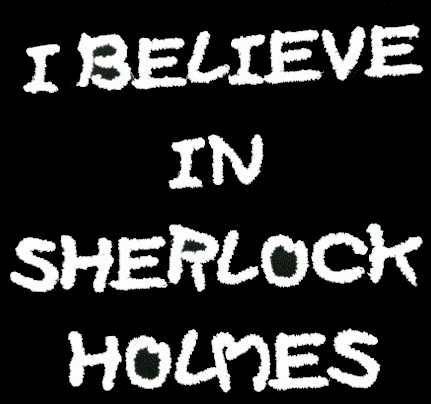
BBC Sherlock Fan Forum - Serving Sherlockians since February 2012.
- AliceI
- Cipher Expert
 Offline
Offline 
- From: Upstate NY
- Registered: February 6, 2013
- Posts: 169
? Say What ?
This thread is for non-British Sherlock lovers to ask, "What was that?"
For instance what the devil is an ASBO? I'm guessing it is the equivelant of a misdeminor here in the states.
Here's another one; in TRF right after John calls Sherlock a machine he says "sod this" I thought he was saying "stop this" but after listening carefully and then turning on the closed captioning it turns out he is saying "sod". So what does it mean? From context it seems like you could replace the word sod with the f-word. Is that basically what it means?
I have lots more but I have to go get ready for work. I'll post more questions later.
Oh wait I do have one more. It is been pointed out to me that in Britian they don't use the term ER or ED for the emergency room, so what do you call the place you go when you need stitches or have a car accident?
"I may be on the side of the angels,
but don't think for one second that I am one of them."
- Mnemosyne
- Mycroft's Contact
 Offline
Offline - From: UK
- Registered: November 23, 2012
- Posts: 515
Re: ? Say What ?
ASBO: 'Anti Social Behavior Order'... to be honest they're a bit of a joke in this country but the main point is they are largely handed out to *young* offenders (some of whom treat it more like a badge of honor than a punishment.) So for someone like John Watson, a soldier and war hero (and most notably not a delinquent youth) to be saddled with one for a crime he did not commit is at once infuriating but ultimately hilarious.
And 'Sod' is a mild expletive. I often use it in the place of 'F**k.' Once derived from the word 'sodomite' it has evolved over time to become an expletive in it's own right. Works well when coupled with 'this', 'off' and with suffix '-ing' (eg 'Sodding Hell!')
And in the UK we have A&E or 'Accident and Emergency' departments.
Last edited by Mnemosyne (March 15, 2013 6:30 pm)
---------------------------------------------------------------------------------------------------------------------------------------------------------

'Non Solum Ingenii Verum Etiam Virtutis'
- Sherlock Holmes
- Administrator
 Offline
Offline 
- From: 221B Baker Street
- Registered: February 7, 2012
- Posts: 5,162
Re: ? Say What ?
Mnemosyne wrote:
And 'Sod' is a mild expletive. I often use it in the place of 'F**k.' Once derived from the word 'sodomite' it has evolved over time to become an expletive in it's own right. Works well when coupled with 'this', 'off' and with suffix '-ing' (eg 'Sodding Hell!')
Don't forget my old favourite - "sod it!"
---------------------------------------------------------------------------------------------------------------------------------------------
Eventually everyone will support Johnlock.
Independent OSAJ Affiliate

- Davina
- Moderator
 Offline
Offline 
- From: The Only Way is Essex UK
- Registered: February 9, 2012
- Posts: 9,714
Re: ? Say What ?
It is definitely not as strong as the F-word. Also 'Sod's Law' which is a bit like 'Murphy's Law'- you know, if something can go wrong it will or if you need something to go in favour of you it won't.
![]()
---------------------------------------------------------------------------------------------------------------------------------------------
Don't make people into heroes John. Heroes don't exist and if they did I wouldn't be one of them.

- Lily
- Official Blogger
 Offline
Offline 
- Registered: February 21, 2013
- Posts: 1,353
Re: ? Say What ?
I've always wondered why Sherlock is arrested on suspicion of "abduction and kidnapping" - where exactly is the difference? I was thinking that abduction was the general term and kidnapping referes to the abduction of children? Why do they use both terms?
--------------------------------

"Yes, of course I forgive you."
- besleybean
- Threatened Knighthood
 Offline
Offline 
- From: Carnoustie, Angus, Scotland.
- Registered: October 4, 2012
- Posts: 21,376
Re: ? Say What ?
My hubby thinks kidnap may imply extortion of money.
---------------------------------------------------------------------------------------------------------------------------------------------------------------
- Davina
- Moderator
 Offline
Offline 
- From: The Only Way is Essex UK
- Registered: February 9, 2012
- Posts: 9,714
Re: ? Say What ?
Abduction means taken with the child's consent. Kidnapping means without the child's ccnsent. So they could accuse him of both but then work out which actually applied.
![]()
---------------------------------------------------------------------------------------------------------------------------------------------
Don't make people into heroes John. Heroes don't exist and if they did I wouldn't be one of them.

- Lily
- Official Blogger
 Offline
Offline 
- Registered: February 21, 2013
- Posts: 1,353
Re: ? Say What ?
Aah, thank you! ![]()
It's a bit confusing because as far as I know here in Germany we only have one expression. Maybe I should try to find out how it was translated in the dubbed version.
--------------------------------

"Yes, of course I forgive you."
- Mary Me
- High Functioning Sociopath
 Offline
Offline 
- From: Germany, Bonn
- Registered: January 8, 2013
- Posts: 3,250
Re: ? Say What ?
He said: "Ich nehme Sie fest wegen des Verdachts der Kinderentführung und Körperverletzung."
So you were right about the expression.
~~~~~~~~~~~~~~~~~~~~~~~~~~~~~~~~~~~~~~~~~~
"Falling is just like flying, except there’s a more permanent destination."
"Sherlock Holmes is a great man, and I think one day—if we’re very very lucky—he might even be a good one."
"Would you like to-"
"-have dinner?"
"-solve crimes?"
"Oh"

- Mnemosyne
- Mycroft's Contact
 Offline
Offline - From: UK
- Registered: November 23, 2012
- Posts: 515
Re: ? Say What ?
Sherlock Holmes wrote:
Mnemosyne wrote:
And 'Sod' is a mild expletive. I often use it in the place of 'F**k.' Once derived from the word 'sodomite' it has evolved over time to become an expletive in it's own right. Works well when coupled with 'this', 'off' and with suffix '-ing' (eg 'Sodding Hell!')
Don't forget my old favourite - "sod it!"
Ah yes, very good, forgot about that one!
---------------------------------------------------------------------------------------------------------------------------------------------------------

'Non Solum Ingenii Verum Etiam Virtutis'
- AliceI
- Cipher Expert
 Offline
Offline 
- From: Upstate NY
- Registered: February 6, 2013
- Posts: 169
Re: ? Say What ?
There is a word that I have heard used in different ways and I'm guessing it is a bad (nasty) word.
Bugger.
I have heard it in the phrase "bugger off" I thought that meant "F-off."
I heard it used as an expletive, and I've heard people called derivations of the word, but what got me wondering about it was how it was used in a miniseries that Benedict Cumberbatch starred in To the Ends of the Earth.
The word used in that was Buggery, and it was clearly meant to mean male rape. That is quite a bit different than the examples above. I mean even the mention of that word made one of the female characters faint.
The miniseries is a period piece (1800s) so is that basically the origins of the term bugger?
"I may be on the side of the angels,
but don't think for one second that I am one of them."
- •
- besleybean
- Threatened Knighthood
 Offline
Offline 
- From: Carnoustie, Angus, Scotland.
- Registered: October 4, 2012
- Posts: 21,376
Re: ? Say What ?
Yep.
---------------------------------------------------------------------------------------------------------------------------------------------------------------
- Davina
- Moderator
 Offline
Offline 
- From: The Only Way is Essex UK
- Registered: February 9, 2012
- Posts: 9,714
Re: ? Say What ?
I don't normally just refer folks to wikipedia but in this case it summarises exactly what the term meant and its origins. It is not as strong a word as the F word and can be used with slight affection.
![]()
---------------------------------------------------------------------------------------------------------------------------------------------
Don't make people into heroes John. Heroes don't exist and if they did I wouldn't be one of them.

- AliceI
- Cipher Expert
 Offline
Offline 
- From: Upstate NY
- Registered: February 6, 2013
- Posts: 169
Re: ? Say What ?
Here is another term I have heard used and then read it in a Sherlock fan fiction.
Plaster
Now from what I understand this is meant to mean a band-aide? Why would anyone call a band-aide "plaster"?
The first time I heard it was watching another British TV show called Primeval. One of the characters had a gash on his leg and one of the other characters said "Come on let's get a Micky Mouse plaster on that." I never really understood what he was saying. By context it meant some sort of first aide or bandage but I couldn't wrap my head around the use of the word plaster. Maybe he was referring to a cast which in the old days were made out of plaster.
Can someone please clear up the whole "jumper" thing for me. Here in the states a jumper is what we call a little girl's dress. It is usually sleeveless and can be worn with a shirt that has decorative collar and sleeves or just as a dress without sleeves in the warm weather.
I have heard jumper refered to in British television in at least three different ways. The first time I heard it was when River Song first regenerates into her final form. She is wearing what I would call a Jumper and she goes and looks at her new body and likes what she sees. She shouts out "I'm going to be wearing a LOT of jumpers!"
It is refered to in Sherlock as either a shirt or a sweater. In Doctor Who Christopher Eccelstein grabs his button up long sleeved shirt and asks "What's wrong with this jumper?"
So really what exactly is a jumper?
Last edited by AliceI (March 26, 2013 5:20 am)
"I may be on the side of the angels,
but don't think for one second that I am one of them."
- •
- besleybean
- Threatened Knighthood
 Offline
Offline 
- From: Carnoustie, Angus, Scotland.
- Registered: October 4, 2012
- Posts: 21,376
Re: ? Say What ?
Oh you've picked some beauties!
Yes, we call band aids(trade name) plasters.
We would call a plaster cast, a cast!
The whole jumper thing(from U.S) point of view, was a revelation to me.
Over here, a(generally) woollen top you put on to be warm is any of the following(UK has massive variety in language)jersey,jumper, pullover, sweater...
Female clothing is either: dress, pinafore, skirt...or cullottes I suppose.
But a dress can also be a frock or gown and a skirt could be a kilt.
I would tend to only call a more smart top a shirt, otherwise I would call it a sweatshirt or long sleeved tshirt.
Actually for me, shirt has to button right down the front. If it's over your head, it's either a jumper(woollen/warm) or a sweat shirt(long sleeved t shirt).
Last edited by besleybean (March 26, 2013 7:01 am)
---------------------------------------------------------------------------------------------------------------------------------------------------------------
- Davina
- Moderator
 Offline
Offline 
- From: The Only Way is Essex UK
- Registered: February 9, 2012
- Posts: 9,714
Re: ? Say What ?
Plasters are called plasters here because originally they were a 'plaster' i.e. a cream attached by a bandage. Later these were made in a more commercial way. Band-aide is a specific brand name and is used in North America rather than the term plaster which we in the UK still use. It is similar to the ay we tend to use the word 'Hoover' rather than vacuum cleaner, even when used as a verb e.g. Hoovering.
There was a discussion some time ago about the use of the word 'jumper' etc. I will have a search around for it.
![]()
---------------------------------------------------------------------------------------------------------------------------------------------
Don't make people into heroes John. Heroes don't exist and if they did I wouldn't be one of them.

- veecee
- Official Blogger
 Offline
Offline 
- From: USA
- Registered: June 11, 2012
- Posts: 1,794
Re: ? Say What ?
Davina wrote:
Plasters are called plasters here because originally they were a 'plaster' i.e. a cream attached by a bandage. Later these were made in a more commercial way. Band-aide is a specific brand name and is used in North America rather than the term plaster which we in the UK still use. It is similar to the ay we tend to use the word 'Hoover' rather than vacuum cleaner, even when used as a verb e.g. Hoovering.
There was a discussion some time ago about the use of the word 'jumper' etc. I will have a search around for it.
The roommate of the murdered security guard mentions hoovering.
- besleybean
- Threatened Knighthood
 Offline
Offline 
- From: Carnoustie, Angus, Scotland.
- Registered: October 4, 2012
- Posts: 21,376
Re: ? Say What ?
I always try and say vacuuming.
---------------------------------------------------------------------------------------------------------------------------------------------------------------
- Sherlock Holmes
- Administrator
 Offline
Offline 
- From: 221B Baker Street
- Registered: February 7, 2012
- Posts: 5,162
Re: ? Say What ?
Yeah, Hoover is actually a brand name, like Dyson. But nobody ever says they're Dysoning.
---------------------------------------------------------------------------------------------------------------------------------------------
Eventually everyone will support Johnlock.
Independent OSAJ Affiliate

- Sherlock Holmes
- Administrator
 Offline
Offline 
- From: 221B Baker Street
- Registered: February 7, 2012
- Posts: 5,162
Re: ? Say What ?
besleybean wrote:
Over here, a(generally) woollen top you put on to be warm is any of the following(UK has massive variety in language)jersey,jumper, pullover, sweater...
....
Actually for me, shirt has to button right down the front. If it's over your head, it's either a jumper(woollen/warm) or a sweat shirt(long sleeved t shirt).
This pretty much sums up my definiton of a jumper too.
Not to mention another use of the word "jumper" in the Great Game when referring to people who jump onto railways tracks.
---------------------------------------------------------------------------------------------------------------------------------------------
Eventually everyone will support Johnlock.
Independent OSAJ Affiliate


 1
1